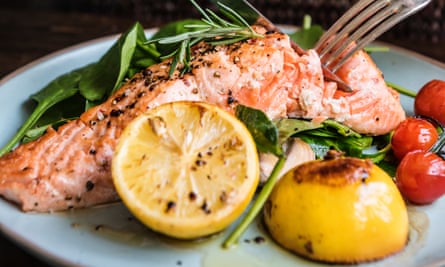Until relatively recently, if you were mixing a scoop of powdered creatine into a glass of water each day, it probably meant you were a bodybuilder or training for an athletic event. Although creatine is a compound that occurs naturally in the body, its role in producing quick bursts of energy meant that, if you took extra, it was assumed to be in order to (legally) enhance your performance – to help you squat a fractionally heavier weight or run a bit faster.
But evidence has been mounting that creatine may play an important role in cognitive function and improving brain health – and could be more beneficial to women than it is to gym bros. So, should we all take it – or at least try to get more of it from food?
Let’s start with creatine’s best-understood benefit – boosting physical power and energy. In the simplest terms, the body generates energy by breaking down a molecule produced from glucose called adenosine triphosphate (ATP). The problem is that ATP isn’t easy for the body to store, so it’s produced constantly and used up fairly quickly. This means that the small amount of ATP normally available provides enough energy for your body to run at full capacity for just a few seconds – which is why sprinters and weightlifters can give near-maximum effort only in short bursts.
Creatine aids this process by acting as a buffer: it allows ATP to be produced more quickly, so that you can give more effort for longer.
The effect can be dramatic. In some studies, it has helped volunteers to increase the amount of weight they can lift by more than 30% and, in other research, to add significantly more muscle. More recently, studies suggest that supplementing with creatine when following a training programme can help people 50 or older to lose moderate amounts of body fat and may help with recovery from tough training sessions.
But the benefits go beyond getting stronger, faster or leaner. Creatine may help older people in various other ways. “We’ve known for a long time that creatine helps muscle protein synthesis – the research on that is quite clear,” says Dr Henry Chung, a lecturer in sport, rehabilitation and exercise science at the University of Essex. “But there’s now a lot of research to say that creatine might have beneficial effects on age-related issues, like muscle loss or cognitive decline. It’s not conclusive – and it might be more beneficial for some people than others.”
A meta-review of more than 1,000 studies, published in 2021, suggests that creatine may deliver a host of beneficial effects in the body, from helping to control blood-sugar levels to lowering cholesterol and risk of stroke. But where does cognitive function fit in?
“The brain consumes a lot of energy to function properly,” says Dr Jenna Macciochi, an immunologist at the University of Sussex who specialises in the intersection of nutrition, movement and lifestyle with health; she is also part of a team developing a creatine supplement for post-menopausal women. “By supporting our energy systems, creatine supports the neurons of the brain as they do their job. There’s a decent amount of evidence supporting the idea that it helps with things like mental clarity, focus and cognitive endurance over long periods of time.”
A study released in February, for instance, suggests that, if you are sleep-deprived, creatine can diminish some of the negative effects. Other studies have been conducted into whether it works as an antidepressant (more research is needed).
Another, longer-term benefit is still being investigated, says Macciochi: “It might have neuroprotective properties, which means it can help protect the brain from damage caused by things like oxidative stress – which is basically what happens when the free radicals being produced by things like alcohol, cigarette smoke or pollution outweigh the antioxidants your body is producing.”
Oxidative stress is a central driver of ageing, she says: “Like a car rusting over time … even if you take really good care of it, there’s a certain amount of wear and tear that builds up.”
While there isn’t enough evidence to show that creatine can protect against neurodegenerative disease such as Alzheimer’s, the effects it has shown on cognitive decline make it a promising area of investigation. And it may be more beneficial for women than men.
“I’ve seen creatine be hugely beneficial for women going through perimenopause,” says the dietitian Brittany Werner, who is the director of Working Against Gravity, a nutritional coaching company. “Women generally have between 70% and 80% less creatine stored than men and also tend to consume less through diet. That means it can be really important for women to make sure they are getting enough – especially during periods of hormonal fluctuations, including periods, pregnancy, postpartum, perimenopause and post-menopause.”
So, how do you make sure you are getting enough? If you are an enthusiastic omnivore, you may have plenty in the tank – creatine is a carninutrient, which means that most of us can ingest it only through animal products (babies get it from breast milk).
Wild game is one of the best sources, but red meat and fish – particularly herring, salmon and tuna – are excellent, as are most types of milk and cheese. If you are a vegan, you will have to rely on the stores your body can produce through amino acids – you can top these up with seeds, grains, nuts and legumes, but you could be operating with sub-optimal levels. Extremely low levels may lead to weight loss or fatigue, but even a bit of a deficit can leave you tired or struggling at the gym.
So, how much should you take – and how? Traditionally, the way to supplement creatine was as a scoop of (slightly gritty) powder in water, but brands have branched out into tablets, gummies and more. It’s most often sold in monohydrate form – so called because each creatine molecule is bound to a water molecule. Other kinds, such as creatine hydrochloride and creatine ethyl ester, are sometimes claimed to be more readily absorbed by the body, but the research is inconclusive.
“The dosing is a bit challenging,” says Macciochi. “We know very well that, in terms of exercise performance, 3g to 5g a day is a really solid dose – if you take it consistently, that’s going to give you evidence-based performance improvements. But in terms of other benefits, some studies are using 10g a day and some even 20g, depending on the conditions they are studying, so it’s still under discussion.”
Bodybuilders used to suggest a “loading” phase – extra helpings to get your body’s stores up to speed quickly – but that is probably unnecessary, Macciochi explains. “If you’re already 70% saturated, you want to get to 100% – you can do that quicker by taking a higher dose and then going on a maintenance dose,” she says. “But if you start on a maintenance dose, like 5g a day, and then continue on it, it’s only going to take a couple of days longer. I think the loading idea comes from the need to get those performance benefits in the gym as soon as possible, but it’s not strictly necessary.”
It used to be thought that supplementing with creatine increased the risk of dehydration from heavy exercise, but a 2021 meta-review rules out this effect – high doses can increase muscular water retention, but that seems to taper off once the body has adapted.
It was also thought that creatine might affect kidney function; a recent meta-analysis seems to suggest otherwise, although it’s important to note that if you already have kidney damage, excess creatine may worsen it. Consult a doctor before starting any supplement programme.
Finally, some scare stories have linked creatine to baldness, with one 2009 study finding increased levels of DHT, a byproduct of testosterone that can lead to hair loss. However, the study looked only at 20 men, the dose was very large (20g a day, which almost no one would recommend for everyday use) and no direct link was found. In any case, the 2021 meta-review seems to have ruled out the problem.
Some studies have found that gut problems, including diarrhoea and belching, can occur with high doses, but these seem to be avoidable. “Generally speaking, it doesn’t seem to bother most people, but gut health is unique to us,” says Macciochi. “That said, if you take it with food or drop the dose and build up slowly, it gives your body a chance to adapt better. It’s like any sudden dietary change – you get digestive feedback.”
To sum up, creatine has benefits for strength and sports performance, seems to have benefits for cognition and could support women’s health during menopause. But it’s not a magic formula. “Creatine works because you can push yourself at an intensity that creates an adaptive response,” says Chung. “If you take creatine and don’t do those activities, whether physical or cognitive, the benefits are likely to be quite minimal.”
In other words, you still have to do the work. But you probably knew that anyway.
Eat for your age
Creatine isn’t the only nutrient that it can be helpful to top up as you get older. Here is what else you may be missing.

Vitamin D
Crucial for maintaining bone, muscle and teeth health (it helps the body absorb calcium), especially for older women who are at higher risk of osteoporosis after menopause. It’s impossible to get enough from the sun during the UK’s winter months. You can get some through oily fish, eggs, liver and red meat, but the government recommends everyone take a 10 microgram (400iu) supplement from the end of September until late March. It is advised not to exceed this dose.
Potassium
This helps the body to send nerve signals and regulate muscle contraction, but has also been shown to help reduce high blood pressure and the risk of kidney stones. Top up by eating avocados, sweet potatoes and spinach.
Vitamin B12
B12 is important for creating red blood cells – fatigue is often an early sign that you are not ingesting enough. Getting adequate B12 can be a challenge for older people due to changes in digestion as we age – fish, meat, poultry and eggs are all good sources, but if you are concerned, it’s worth talking to a doctor about supplementing.

.png) 1 month ago
11
1 month ago
11













































